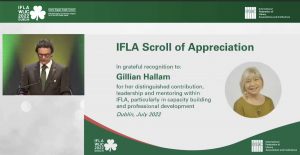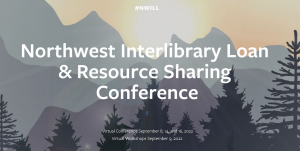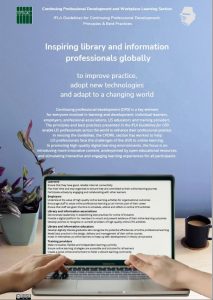contributed by Gill Hallam

The IFLA Scroll of Appreciation is awarded in recognition of the contribution of “an individual who has given distinguished service to IFLA as a volunteer engaged in a committee or group, in addition to efforts in fostering IFLA values” [1]. At the closing ceremony of the WLIC in Dublin last month, three IFLA Scrolls of Appreciation were conferred: to Sanjay Kumar Bihani, to Sueli Mara Soares Pinto Ferreira, and to me. To be nominated for such a prestigious award was, firstly, an incredible surprise, and secondly, an incredible honour.
Very sadly, 2022 was the one year that I could not attend the WLIC, but I thank Christine Mackenzie, past-President of IFLA, for receiving the award on my behalf.
The citation states that this IFLA Scroll of Appreciation recognises “Gillian’s distinguished contribution, leadership and mentoring within IFLA, particularly capacity building and professional development. Her achievements have maximised the potential of individual librarians, as well as those involved in IFLA’s committees and in library associations across Asia and Oceania”.
These words are very humbling, because – just like all my friends and colleagues across the IFLA community – I have simply been doing what I love doing! Nevertheless, I am over the moon to know that through this award, IFLA acknowledged the imperative for learning and development for everyone working in the library and information profession!
I would argue that, for many years now, IFLA has been ‘my tribe’: my involvement in the organisation has provided me with so many wonderful opportunities to connect and work with talented and passionate library and information professionals across the world. My own career has in fact been a very international one (I have been fortuntate to live and work in the United Kingdom, Europe, Africa, Asia, the Pacific Islands and Australia), so when I was introduced to IFLA’s activities by my colleagues with the Australian Library and Information Association (ALIA), Jennefer Nicholson and Christine Mackenzie, new energy was injected into my professional life.
My first job after migrating to Australia in the early 1980s was as a special librarian in the corporate sector in Brisbane. It was an exciting role, but as the solo librarian in the firm, I felt that the need to actively seek out like-minded LIS colleagues with whom I could explore and discuss professional issues. After becoming a member of ALIA as a new graduate, I discovered plenty of rewarding avenues to network and to contribute productively to the profession, and as my career evolved through the different roles as LIS practitioner, educator and researcher, there were opportunities to lead and to mentor others.
Certainly, my involvement with IFLA represented the chance to explore new and interesting activities. After initially serving as a member of the Standing Committee for the Section for Education and Training (SET), I joined the Section for Continuing Professional Development and Workplace Learning (CPDWL). Since 2015, I have served as ALIA’s nominee on the CPDWL Standing Committee.
It is really very hard NOT to get engaged with the work of CPDWL! Along with other members of the Standing Committee, I have been directly involved in so many great activities:
- developing and updating of the IFLA Guidelines for Continuing Professional Development: Principles and Best Practices
- translating the Guidelines for CPD poster into over 30 languages
- planning and running the CPDWL open sessions at the WLIC, in partnership with other IFLA sections and SIGs
- participating in the IFLA Coaching Initiative with the Management and Marketing Section
- hosting a table at the Knowledge Café at the WLIC with the Knowledge Management Section
- contributing to the New Librarians Global Connection webinars with the New Professionals SIG, supported by the American Library Association.
- and much, much more…
Importantly, CPDWL’s satellite meetings have always provided smaller groups of people within and beyond IFLA to work closely together to plan and coordinate the specialised conference program, the most recent event held in Zagreb, Croatia (2019), in partnership with the Croatian Library Association.
The CPDWL team communicates to the world about all these activities through the CPDWL Newsletter and through its social media channels. In 2018, CPDWL was the inaugural winner of the IFLA Dynamic Unit and Impact Award, which recognises a section’s achievements in engaging members, developing strong identity and leadership, and communicating its activities within and beyond IFLA. Building on this success, in 2020 CPDWL received a special mention for the section’s excellent planning and clear and effective communication.
Beyond CPDWL, I also had the remarkable opportunity to contribute to IFLA’s Building Strong Library Associations (BSLA) program, generously underwritten by the Bill and Melinda Gates Foundation. My involvement included preparing 20 case studies to support and expand the workshop materials, and to develop the BSLA Train the Trainer program. As one of the core trainers in the BSLA program, I was exceptionally fortunate to work with enthusiastic and committed LIS professionals with:
- the Ukrainian Library Association (ULA)
- the Arab Federation of Library Institutions (AFLI)
- the Sri Lankan Library Association (SLA)
- the Nepal Library Association (NLA)
- the Pacific Islands Association of Libraries, Museums and Archives (PIALA).
In addition I was able to collaborate with colleagues from across the world at IFLA’s own BSLA convenings held in Berlin, Manila and The Hague.
Over the years, I have learnt so much from other IFLA members and officers, from other BSLA trainers and from IFLA staff members: you have all helped me grow and develop personally and professionally. Without doubt, the amazing journey I have travelled has been a shared experience with you, all the friends I have in ‘my tribe’. You all know who you are: you have brought so much richness to my career and to my life, and therefore I dedicate the IFLA Scroll of Appreciation I have been awarded to each and every one of you. See you all in Rotterdam next year to celebrate!
[1] https://www.ifla.org/ifla-scroll-of-appreciation/



